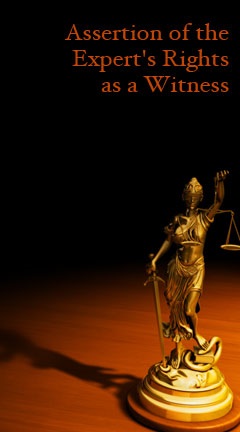Archival Notice
This is an archive page that is no longer being updated. It may contain outdated information and links may no longer function as originally intended.
Home | Glossary | Resources | Help | Course Map
Counsel sponsoring or retaining the expert's services as a testifying witness has a considerable obligation to maintain the examination, either in deposition or trial, on a proper course. The expert and retaining counsel should determine in advance what procedures will be followed if abusive, harassing, antagonistic or improper questioning is encountered.
Following is a list of many of the devices available to the expert for self-protection. Knowing what an expert may properly do to protect the expert witness role and position may mean the difference between success and failure as an expert in a particular case, or in general.
- Understand thoroughly the extent of your rights as an expert witness.
- Develop a prearranged signal between you and retaining counsel that alerts counsel of your belief that a particular line of questioning is outside the scope of propriety. For example, ask, "Is that a proper question?" or "May I have that question again?" to cue your counsel.
- You may ask the court reporter in deposition to mark a particular question and answer for future reference in the event you believe, for any reason, that a question is improper.
- You could, in a polite and professional way, refuse to answer an objectionable question or to be examined in an objectionable way. Control of your voice, emotions and the moment are essential in such a setting.
- During a deposition proceeding, you may ask for a recess at reasonable times to consult with your own private attorney (whom you may have engaged to assist you in deposition or trial matters). Your personal attorney is to be distinguished from the attorney who has engaged your professional services as an expert witness. It is often necessary in grossly abusive situations to engage and have your personal attorney present during deposition or trial proceedings. You have the right to your own counsel, in or out of the deposition.
- If an abusive situation develops, maintain professional politeness, and a calm and cool demeanor. Tell the examining attorney, on the record, that you believe the questioning or the question is abusive, uncalled for, improper, badgering, harassing or otherwise outside the scope of propriety. In that setting, you may respectfully request that the line of questioning be stopped and that additional or new matters be taken up by examining counsel.
- In the event that improper questioning continues, ask for an opportunity to contact the trial judge before whom the case is pending so the matter might be resolved by the court, literally from the deposition room by telephone. All of this proceeding should be conducted on the record during the deposition. In such an event, the court will need to hear the objectionable deposition questions that are being asked in order to determine whether they are indeed abusive.
Additional Online Courses
- What Every First Responding Officer Should Know About DNA Evidence
- Collecting DNA Evidence at Property Crime Scenes
- DNA – A Prosecutor’s Practice Notebook
- Crime Scene and DNA Basics
- Laboratory Safety Programs
- DNA Amplification
- Population Genetics and Statistics
- Non-STR DNA Markers: SNPs, Y-STRs, LCN and mtDNA
- Firearms Examiner Training
- Forensic DNA Education for Law Enforcement Decisionmakers
- What Every Investigator and Evidence Technician Should Know About DNA Evidence
- Principles of Forensic DNA for Officers of the Court
- Law 101: Legal Guide for the Forensic Expert
- Laboratory Orientation and Testing of Body Fluids and Tissues
- DNA Extraction and Quantitation
- STR Data Analysis and Interpretation
- Communication Skills, Report Writing, and Courtroom Testimony
- Español for Law Enforcement
- Amplified DNA Product Separation for Forensic Analysts


